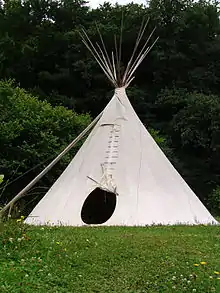teepee
English
Etymology 1
From the Lakota word thípi (/ˈtʰipi/), which consists of two elements: the verb thí (“to dwell”), and pi, a pluralising enclitic (a suffix-like ending that marks the subject of the verb as plural), which means "they dwell". Lakota verbs can be used as nouns and this is the case with thípi, which in practice just means "house".
Pronunciation
- (US) IPA(key): /ˈtiːpi/
Translations
See also
- other traditional Native American dwellings:
- hogan (used by the Navajo in the southwestern United States)
- igloo (used by the Inuit, made of snow)
- teepee (used in the Great Plains)
- tupik (used by the Inuit during the summer)
- wetu (used by the Wampanoag in the northeastern United States)
- wickiup (used in the southwestern and western United States)
- wigwam (used in the northeastern United States)
This article is issued from Wiktionary. The text is licensed under Creative Commons - Attribution - Sharealike. Additional terms may apply for the media files.
